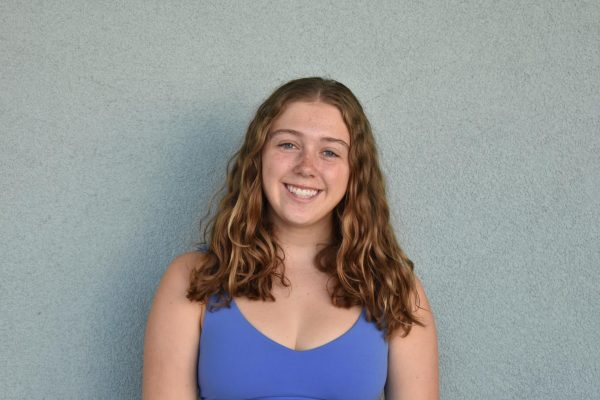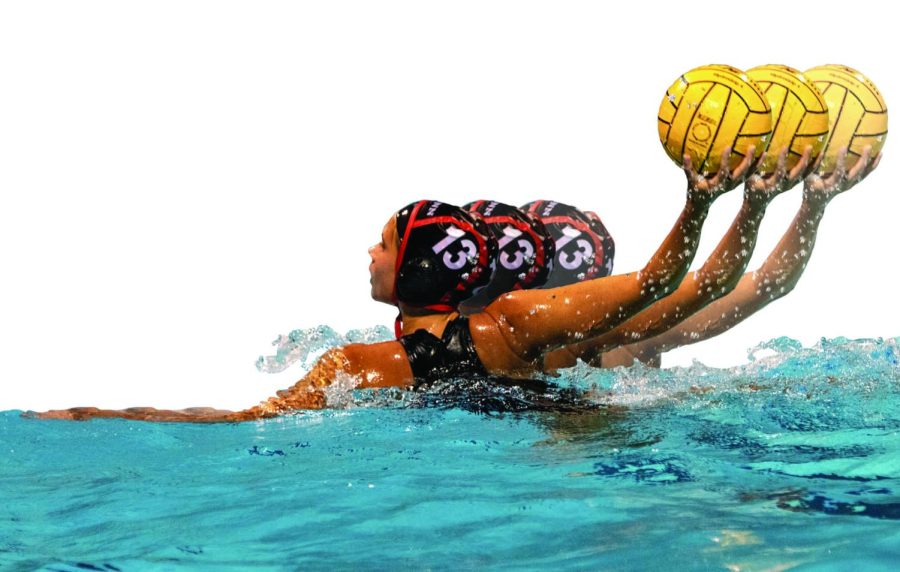Road to recovery: Junior Nina Albers’ journey through two tough injuries
Since the age of 7, water polo has been a pillar of junior Nina Albers’ life. Over the past 10 years, she has experienced the ups and downs that come with putting her all into a sport: Sweet victories strengthen her love for playing, and tough losses feel like rock bottom. Wins and losses aside, however, few athletes know as well as Albers that the most trying moments in sports come from injuries.
Albers’ first taste of a season-wrecking injury was a bike accident in the fall of 2021. “I was biking home downhill, and there was a tree root (that made) a big crack in the path,” she said. “When my bike hit the crack, I got flipped over (the handlebars) and my face was smashed into the ground.”
After a trip to the emergency room and 20 stitches to the mouth, Albers sat in bed trying to figure out how to break the news to her coach. “(Central Coast Sectionals) were coming up in a couple weeks, and I couldn’t get in the water because I couldn’t even open my mouth,” she said.
Over the next two weeks, Albers sat on the bench in silence, watching her team play. “The worst part might have been all the people that came up to me at games,” she said. “Coaches and moms and players would come up to ask me why I wasn’t playing, and I just had to sit there. My mouth was sewn shut.”
Her coach’s empathy helped her through this isolation. “When you’re injured, and the coach comes and talks to you about how you’re feeling, or you just have a good, normal conversation, it makes you feel so (much more) connected with the team,” Albers said. “(Talking to my coach) made me feel a lot better because (then I knew) they’re not forgetting about me just because I’m injured — they’re just focusing on the girls who can play right now.”
When CCS rolled around, Albers was doing everything in her power to play again. However, her injury wasn’t fully healed, so she was forced to slowly ease back into training. “I was so weak when I started playing (again),” she said. “I had barely eaten because I couldn’t open my mouth. All I could do was stick a straw in the corner of my mouth for a few days, so I (had) lost weight.”
During that 2021 season, the girls varsity water polo team went on to win the Division III Northern California title, going further than any other Gunn girls’ water polo team ever had. To win the championship, the team went through a series of knockout games: Every time they got in the water, they could either win or go home. This new pressure only added to Albers’ drive to play. “Our team already had some injuries and illnesses taking people out,” she said. “So even though I wasn’t quite ready to get back in the water, I just kept insisting (to my coach), ‘I’m fine. I’m fine.’ I hit my mouth with my hand to show (my coach) that I was okay.”
Fighting the urge to play, Albers had to remind herself that her health was the priority. “(I had to) remember that the pressure is not on me — that just because I’m (injured) does not mean my teammates are angry at me,” she said. “Whenever anybody on a team has an injury, all of (your) teammates just want you to get better.”
Thankfully, the season ended without further damage to Albers’ mouth. She was able to fully recover as she transitioned into her summer club season at NorCal Aquatics, where she would face her toughest injury yet.
While working at a kids’ camp during the summer of 2022, Albers spent much of the day entertaining 8-year-olds. In early July, she was running with campers when she slipped on grass and landed awkwardly on her back — once again, directly on the root of a tree. “I thought I just winded myself really hard, but I couldn’t get up and I couldn’t breathe,” she said.
During practice later that day, Albers was plagued by extreme back pain. “I think it took me almost half an hour to finish (the) warmup,” she said. “My coach was just watching me trying to complete 200 (yards of) freestyle and was eventually like, ‘I think you need to get out and just go home.’” With the Junior Olympics — the biggest tournament of the year — quickly approaching, the reality of her injury was a tough pill to swallow.
During the Junior Olympics tournament, Albers was not feeling better and was unable to play to her full capability. “My coach was giving me very controlled playing time,” she said. “I was in for two minutes, then I’d take a break, then in for two minutes, then another break.”
For this specific tournament, however, there was more at stake for Albers than simply missing the sport she loved. “I remember sitting (on the bench) thinking, ‘Oh my gosh, all of these (college) coaches are going to think I’m terrible at the sport, (and) my teammates are going to be so angry that I’m not helping their games,’” she said.
Although Albers wanted to play, her coaches again guided her to listen to her body’s needs. “My coaches would pull me aside and say, ‘Look, injuries happen, but you can’t push yourself because if you do, this is going to stay with you for life and you’re never going to recover,’” she said. “As much as I didn’t want to listen to them, I kind of had to because I knew deep down that was the only thing that was going to fix (my injury in the) long term.”
The Junior Olympics finally came to a close, and Albers was able to give her body some much-needed rest. While recuperating, she found out via an MRI scan that for the past three months, she had been living — and playing water polo — with a fractured spine. This discovery was a wake-up call for Albers, who resolved to take rest more seriously and to make recovery a priority at the dawn of the upcoming fall season. “I was really grateful that (for) high school season, our coach let me take almost an entire month and a half off,” she said. “That month and a half really gave me time to let my back fully heal, (while also) healing my other existing injuries such as a shoulder overuse problem that (I’d) been struggling (with) for the past two years.”
By the end of her recovery, Albers had found the value in taking time to let her body rebuild. “In the high school season, once (I) finally got to (play in) games, it was so much better, because my body actually felt good — it didn’t hurt every time I had to go to practice,” she said.
The effects of this recovery period continue to improve Albers’ life, a year after her back injury. “Now, going (into summer) club season, I can practice every single day, and my shoulder has been fine and I don’t really have issues with my back anymore,” she said.
Your donation will support the student journalists of Henry M. Gunn High School. Your contribution will allow us to purchase equipment and cover our annual website hosting costs.

Vivian Studdert is a senior and a sports editor for The Oracle. Outside of school, Vivian enjoys reading, swimming and traversing the supermarket.


